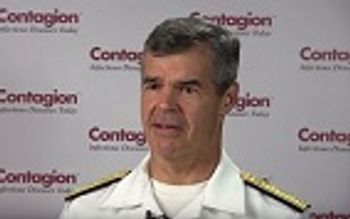
Thomas Sandora, MD, MPH, hospital epidemiologist at Boston Children’s Hospital, explains the importance of hand hygiene in healthcare associated infection prevention in pediatric settings.

Thomas Sandora, MD, MPH, hospital epidemiologist at Boston Children’s Hospital, explains the importance of hand hygiene in healthcare associated infection prevention in pediatric settings.

Jeff Boyd, PhD, assistant professor of Biochemistry and Microbiology at Rutgers School of Environmental and Biological Sciences, explains how copper can be used to prevent a Staphylococcus aureus infection.

Michael Calderwood, MD, MPH, previously assistant hospital epidemiologist and associate director of antimicrobial stewardship at Brigham and Women’s Hospital, outlines ways in which infection prevention strategies can be modified to fit the needs of immunocompromised individuals.

Thomas Sandora, MD, MPH, hospital epidemiologist at Boston Children’s Hospital, lists the most common healthcare associated infections in children.

Jeff Boyd, PhD, assistant professor of Biochemistry and Microbiology at Rutgers School of Environmental and Biological Sciences, examines the virulence factors of Staphylococcus aureus.

Michael Calderwood, MD, MPH, previously assistant hospital epidemiologist and associate director of antimicrobial stewardship at Brigham and Women’s Hospital, discusses some up and coming infection prevention strategies.

Gonzalo Bearman, MD, MPH, hospital epidemiologist, Virginia Commonwealth University, explains the risk of animal to human infection transmission during personal pet, service animal, and assisted-therapy animal healthcare setting visitations.

Gonzalo Bearman, MD, MPH, hospital epidemiologist, Virginia Commonwealth University, describes possible protocols that healthcare institutions can implement in order to reduce the risk of animal to human infection transmission.

Marion A. Kainer, MD, MPH, FRACP, FSHEA, director, Healthcare Associated Infections and Antimicrobial Resistance Program, Tennessee Department of Health, outlines currently available strategies to avoid antimicrobial resistance.

Jason C. Gallagher, PharmD, FCCP, FIDSA, BCPS, President, Society of Infectious Diseases Pharmacists, in light of the recent antibiotic resistant superbug, shares if we will see more cases of antibiotic resistance in the United States.

Gonzalo Bearman, MD, MPH, hospital epidemiologist, Virginia Commonwealth University, discusses the benefits of animals visits to healthcare settings.

Jason C. Gallagher, Pharm.D., FCCP, FIDSA, BCPS, President, Society of Infectious Diseases Pharmacists, in light of the recent antibiotic resistant superbug, tells Contagion what keeps him up at night.

Gonzalo Bearman, MD, MPH, hospital epidemiologist, Virginia Commonwealth University, explains the importance of collaborations between healthcare providers and veterinarians to understand the risks of infection transmission between animals and humans.

Michael Calderwood, MD, MPH, previously assistant hospital epidemiologist and associate director of antimicrobial stewardship at Brigham and Women’s Hospital, explains healthcare associated infection risk factors for individuals who are immunocompromised, and prevention methods.

Stephen Redd, MD (RADM, USPHS), Director of the Office of Public Health Preparedness and Response at the Centers for Disease Control and Prevention (CDC) explains the precautions that are already underway to protect the American public from the transference of the Zika virus.

Stephen Redd, MD (RADM, USPHS), Director of the Office of Public Health Preparedness and Response at the Centers for Disease Control and Prevention (CDC) shares the main point to keep in mind about the Zika virus.

Stephen Redd, MD (RADM, USPHS), Director of the Office of Public Health Preparedness and Response at the Centers for Disease Control and Prevention (CDC) shares which infectious disease he feels needs greater attention.

Stephen Redd, MD (RADM, USPHS), Director of the Office of Public Health Preparedness and Response at the Centers for Disease Control and Prevention (CDC) shares how the CDC is working to protect Americans from travel-associated Zika infections and touches on preparations for the Olympics.

Stephen Redd, MD (RADM, USPHS), Director of the Office of Public Health Preparedness and Response at the Centers for Disease Control and Prevention (CDC) explains how the CDC responds to outbreaks.

Stephen Redd, MD (RADM, USPHS), Director of the Office of Public Health Preparedness and Response, at the Centers for Disease Control and Prevention explains what they learned from handling the response to the Ebola outbreak in 2014-2015.

Stephen Redd, MD (RADM, USPHS), Director of the Office of Public Health Preparedness and Response at the Centers for Disease Control and Prevention (CDC) explains how the CDC is partnering with global organizations to proactively act on the Zika virus.

Stephen Redd, MD (RADM, USPHS), Director of the Office of Public Health Preparedness and Response at the Centers for Disease Control and Prevention (CDC) explains how the CDC is working to protect Americans from the Zika virus.

Stephen Redd, MD (RADM, USPHS), Director of the Office of Public Health Preparedness and Response at the Centers for Disease Control and Prevention (CDC) explains what the CDC learned from responding to the Ebola outbreak and how this has impacted the response to the Zika virus.

Jason C. Gallagher, Pharm.D., FCCP, FIDSA, BCPS, President, Society of Infectious Diseases Pharmacists, in light of the recent antibiotic resistant superbug, shares if we are ready for more cases.

Marion A. Kainer, MD, MPH, FRACP, FSHEA, provides key points to help healthcare providers prevent healthcare associated infections.

Michael Calderwood, MD, MPH, previously assistant hospital epidemiologist and associate director of antimicrobial stewardship at Brigham and Women’s Hospital, discusses concerns over antibacterial and antimicrobial central line devices.

Michael Calderwood, MD, MPH, previously assistant hospital epidemiologist and associate director of antimicrobial stewardship at Brigham and Women’s Hospital, discusses healthcare associated infections that special populations, such as those who are immunocompromised, are most susceptible to.

Jason C. Gallagher, PharmD, FCCP, FIDSA, BCPS, President, Society of Infectious Diseases Pharmacists, provides more information on the Pennsylvania case of mcr-1 E. coli.

Gonzalo Bearman, MD, MPH, hospital epidemiologist, Virginia Commonwealth University, describes the risks of animal to human infection transmission in healthcare settings.

Prof. Andrea Endimiani, MD, PhD, from the Institute of Infectious Diseases at the University of Bern, Switzerland, discusses how practitioners should test for colistin-resistant pathogens.